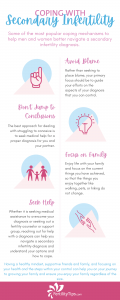A secondary infertility diagnosis is due to the inability to conceive or carry a baby to term after already successfully giving birth to a baby without fertility struggles or the use of assisted reproductive technology. While a secondary infertility diagnosis is typically when trying for baby number two, some couples receive this diagnosis after conceiving more than one child.
There’s no doubt that having fertility struggles after already having a successful pregnancy can be stressful and take its mental toll. Secondary infertility can be a lot to manage for couples. For most couples however, secondary infertility can affect women’s mental health a lot more than it can men’s, and finding the right coping mechanisms can help men and women better navigate a secondary infertility diagnosis.
Coping Tips for Couples with Secondary Infertility
1. Avoid Self-Blame
A secondary infertility diagnosis, surgeries, medical assistance, medication, added stress, or lifestyle choices can all affect mental health and physical fertility health to an extent. The biggest challenge can be struggling to not place blame on yourself for the fertility issues you are experiencing. Rather than seeking to place blame, your primary focus should be to guide your efforts on the aspects of your diagnosis that you can control. If your age is slowing your ability to conceive and weight at your nerves, begin seeking information about lifestyle changes within your control that can improve ovulation, or simply improve your overall health.
2. Don’t Jump to Conclusions
An assumption by many is that women who cannot conceive have a health issue. The best approach for dealing with struggling to conceive is to seek medical help for a proper diagnosis for you and your partner. Drawing conclusions without proper diagnosis can create a whirlwind of possibly unnecessary emotional struggles. Once a proper diagnosis is made, even if it is unexplained infertility, receiving test results to identify the issue or rule out factors can help create a good foundation for narrowing down contributing factors such as lifestyle choices that can be addressed.
3. Focus on Other Aspects of Your Family and Life
As much as growing a family can feel like an all-encompassing aspiration. Dealing with secondary infertility can bring that desire to a halt, so it is important to focus on aspects of your family that are good around you. To help improve your mental health during secondary infertility, concentrate on other things like education, hobbies and activities with the kids you already have; the relationship between you and your partner; enjoying time with pets, parents and grandparents; and hobbies and activities that you enjoy partaking in. It is not healthy to mentally carry the stress and emotions associated with your secondary infertility diagnosis and letting them go now and then to be present and enjoy those around you can be uplifting. Enjoy life with your family so that the things you enjoy together like walking, pets, or hiking do not change.
In addition, work on focusing on the current things you have achieved even as you deal with challenges of secondary infertility. You may find a new boost of confidence and motivation when you can focus on the little victories instead of focusing on the things you can’t. A new promotion at work, a completed project, an extra ¼ of a mile on the morning walk, a successful new meal prep, tackling that pile of laundry from the week, these are all small victories you can celebrate to help boost your mood during stressful times.
4. Avoid Blaming Others
When hard times strike, and a secondary infertility diagnosis throws an obstacle into your family plans, it can be easy to want to seek a source for your frustration, and when trying to avoid the habit of self-blame it can be easy to blame others for your struggle. While you may feel a partner, doctor or parent is to blame for their health risk factors, or inability to solve the problem, it is important to focus on the things you can change, and placing blame will only cause resentment and pain.
It is also important to not place blame on current children. Your fertility struggles are not because of them so it is essential to not deprive them of the joy of enjoying mother’s full attention on a regular basis. Focus on the love between you and cherish the bond you have.
5. Seek Medical Assistance

Take your partner along during the appointment to hear about various treatment options. Develop a fertility treatment game-plan and time frame to try various options. Using medical help and professional guidance can eliminate the helplessness by bringing hope that one of the methods will solve the problem.
6. Get Support or Go for Counseling with Your Partner
In addition to finding complete support through your secondary infertility struggles with your partner, you may be wondering if counseling is the right option for you, or is helpful for your situation.
There are many reasons why seeking out a fertility counselor may help you to deal with the challenges of infertility. This could be because your reproductive endocrinologist recommends it before embarking on certain treatments, or it could be to help you find some comfort and guidance along the emotional path that is infertility. You might find that you feel guilty for not being able to easily conceive another child, there may be some friction or difference in opinions between you and your partner, or you may just need a third party to help provide clarity for your emotions and thoughts on deciding the best treatment option for your family.
You can also ask your fertility specialist or look online for groups that provide support for women with secondary infertility through a support group to get extra emotional support. The feeling of guilt will reduce when you know other women face a similar challenge.
7. Do Not Restrict Yourself to Child Spacing
Some people say that the space between one child and another should be around X years. You may have even created your own expectation that you want your kids to be spaced out by X amount of time. When fertility struggles come into play, it’s time to change your mindset and approach to this concept of the ideal spacing, because the truth is, secondary infertility might derail it and leave you feeling more unnecessary stress or pressure than needed. Pursue solutions at your pace with an acceptance that any time you become pregnant will suit you, even if it is not on track with your initial plan.
You may not have control over getting pregnant, but the key is to not let your fertility struggles define you and your mood, and not neglect your life as it currently is. Engage in self-care practices, like doing the things that relax and make you happy and focus on the things that are within your control, such as building a strong support system around you. Having a healthy mindset, supportive friends and family, and focusing on your health and the steps within your control can help you on your journey to growing your family and ensure you enjoy your family regardless of the size.





